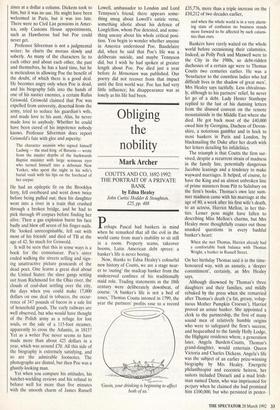Obliging the nobility
Mark Archer
COUTTS AND CO, 1692-1992: THE PORTRAIT OF A PRIVATE BANK by Edna Healey John Curtisl Hodder & Stoughton, £25, pp. 488 Perhaps Pascal had bankers in mind when he remarked that all the evil in the world came from man's inability to sit still in a room. Property scams, takeover booms, Latin American debt sprees: a banker's life is never boring.
Now, thanks to Edna Healey's colourful new history of Coutts, we are a stage near- er to 'outing' the madcap banker from the undeserved confines of his traditionally staid role. Trading statements in the 18th century were deliberately downbeat, of course. 'A banker's life is not a bed of roses,' Thomas Coutts intoned in 1799, the year the partners' profits rose to a record 'Gavin, your drinking is beginning to affect both of us.' £35,776, more than a triple increase on the £10,212 of two decades earlier,
and when the whole world is in a very alarm- ing state of confusion no business stands more forward to be affected by such calami- ties than ours.
Bankers have rarely waited on the whole world before occasioning their calamities. Indeed, as Polly Peck and Maxwell were to the City in the 1980s, so debt-ridden duchesses of a certain age were to Thomas Coutts two centuries earlier. He was a 'benefactor to the countless ladies who led difficult lives in the shadow of great men', Mrs Healey says tactfully. Less chivalrous- ly, although to his partners' relief, he never let go of a debt. Lady Hester Stanhope replied to the last of his dunning letters from the disused convent on the remote mountainside in the Middle East where she died. He got back most of the £40,000 owed him by Georgina, Duchess of Devon- shire, a notorious gambler and in hock to most bankers in Paris and London, by blackmailing the Duke after her death with her letters detailing his infidelities.
The triumph is that Coutts the firm sur- vived, despite a recurrent strain of madness in the family line, potentially dangerous Jacobite leanings and a tendency to make wayward marriages. It helped, of course, to have the King and an almost unbroken line of prime ministers from Pitt to Salisbury on the firm's books. Thomas's own late sum- mer madness came with his marriage at the age of 80, a week after his first wife's death, to an actress, Harriot Mellon, in her thir- ties. Lesser pens might have fallen to describing Miss Mellon's charms, but Mrs flealey more thoughtfully coaxes out those unasked questions in every bashful banker's heart:
When she met Thomas, Harriot already had a comfortable bank balance with Thomas Wright, a banker in Russell Street.
On her birthday Thomas said it in the time- honoured way, with an annuity, a 'deeper commitment', certainly, as Mrs Healey says.
Although disowned by Thomas's three daughters and their families, and mildly rebuked by the press when she remarried after Thomas's death Ca fat, greasy, volup- tuous Mother Pumpkin Croesus'), Harriot proved an astute banker. She appointed a clerk to the partnership, the first of many sound men of relatively humble origins who were to safeguard the firm's success, and bequeathed to the family Holly Lodge, the Highgate residence where, a generation later, Angela Burdett-Coutts, Thomas's grand-daughter, would entertain Queen Victoria and Charles Dickens. Angela's life was the subject of an earlier prize-winning biography by Mrs Healey. Energetic philanthropist and eccentric heiress, her suitors included Disraeli and a mad Irish- man named Dunn, who was imprisoned for perjury when he claimed she had promised him £100,000, but who persisted in pester- ing her with amorous half-limericks:
When to Harrogate sweet papa beats a retreat, To take spa waters supersulphurious, I could hear your heart thump as we stood near the pump, While you bolted that stuff so injurious.
As with most bank histories, the chapters dealing with Coutts' recent decades lack the pace and momentum of the earlier part. This may have something to do with the dread hand of NatWest falling over a greater part of the business in the years fol- lowing 1969, when the National Provincial, which had owned Coutts since 1919, merged with the Westminster. While undoubtedly the jewel in the crown, Coutts within NatWest seems a wasted asset to most City analysts. Whether this is due to mismanagement, a clash of cultures or stand-offishness on both sides, are questions Mrs Healey tactfully ignores in this highly enjoyable tricentennial tribute.



























































 Previous page
Previous page